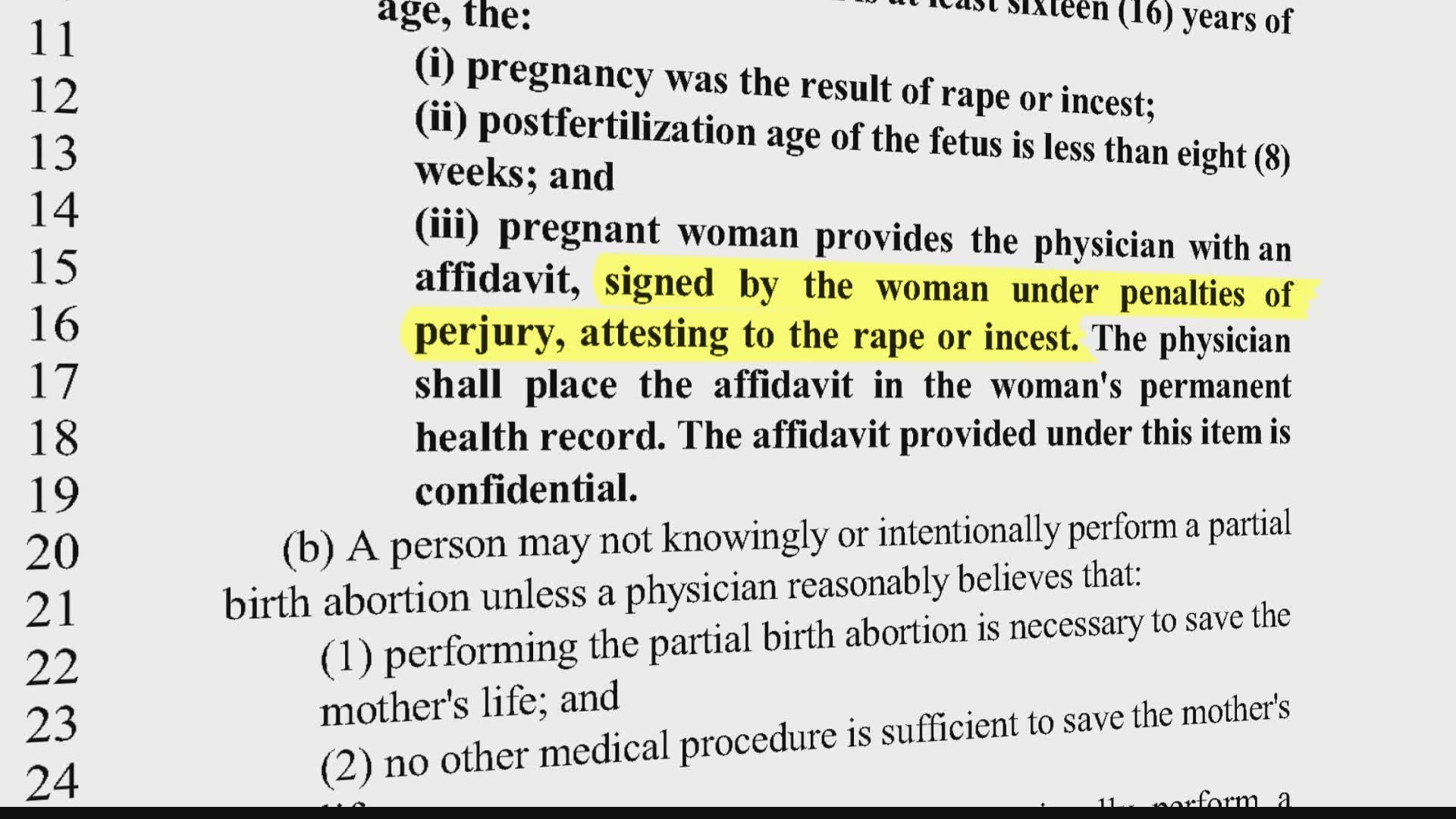INDIANAPOLIS — When Senate Bill 1 was introduced last week by Senate Republicans to further restrict abortion in Indiana, the bill's sponsor said the bill was aimed at protecting the unborn, not to penalize women.
“It does not criminalize women seeking an abortion.” Sen. Sue Glick, R- LaGrange, announced to the press.
But the bill, which allows abortion in only very limited situations, includes language that allows for criminal prosecution if a woman lies to obtain an abortion. The current language of SB1 requires pregnant individuals seeking an abortion for rape or incest to submit an affidavit "signed by the woman under penalties of perjury, attesting to the rape or incest."
Facing questions from Democrats about the mandated affidavits and enforcement, Glick spoke about the affidavit requirement during Tuesday’s special legislative session floor debate:
“They're asking for an abortion under this bill, we're saying we want some documentation of what occurred that justifies an abortion,” she said. “If they're lying and someone can prove that they're lying, then there are repercussions.”
What are those repercussions?
13News reporter Cierra Putman asked the bill's main sponsor after the hearing.
"You said if somebody lies, essentially there should be consequences. What kind of consequences do you think there should be if a woman lies about being impregnated because of rape?” Putman asked.
“We don't want people using the excuse, ‘Oh I was raped,' or this was a matter of incest to bring forth [an abortion],” Glick replied as part of a long answer. She did not, however, provide any details about the legal consequences that pregnant individuals would face under SB 1 if they lie to obtain an abortion.
So 13News asked the question again: “What type of consequences do you think a woman or girl should face if they are found to have lied about rape or incest?” Putnam asked as Glick began to walk out of the Senate chamber.
“I think that's a question and an answer for another day,” the senator replied.
RELATED: Doctors, advocates concerned for rape victims as lawmakers further restrict abortion ban bill
That response does not sit well with Democrats.
“The reason she said that is because she has no answer,” said Sen. Greg Taylor, D-Indianapolis, an outspoken critic of the proposed abortion legislation. He believes the current bill contradicts Republicans’ claim that women seeking an abortion will not be subject to criminal penalties.
“There's no logical reason to criminalize women for exercising their health care options,” he said. “We should not be considering this bill.”
Under the bill’s current language, pregnant individuals who submit a false affidavit to obtain an abortion in Indiana could face significant penalties, according to Jody Madeira, a professor at Indiana University’s Mauer School of Law.
“In Indiana, perjury is a level 6 felony, and that can carry imprisonment of six months to two years and a fine of up to $10,000,” she said. “The current language of SB 1 that states women have to make this affidavit under penalty of perjury is not consistent with an unwillingness to prosecute women. The language sends a message that prosecution is very much possible.”
Madeira told 13News that falsely claiming a rape or incest to obtain an abortion could also be prosecuted as a misdemeanor under Indiana’s false reporting law, which brings a penalty of up to 180 days in prison and a $1,000 fine.
The law professor believes the current bill being considered by state senators raises questions about patient confidentiality. SB1 requires that an affidavit filed with a physician to obtain an abortion in cases of rape or incest must be kept confidential in a woman's medical file.
“The physician shall place the affidavit in the woman's permanent health record. The affidavit provided under this item is confidential,” the legislation says.
But the Office of the Indiana Attorney General has said it wants access to those affidavits for possible criminal prosecutions of the people who committed incest and rape.
“We don’t know yet if law enforcement is going to be empowered to get access to the affidavits,” Madeira said.
The Indiana Senate is expected to vote on the abortion bill later this week before the legislation heads to the House of Representatives, where lawmakers are expected to introduce amendments to further restrict abortion access in Indiana.

